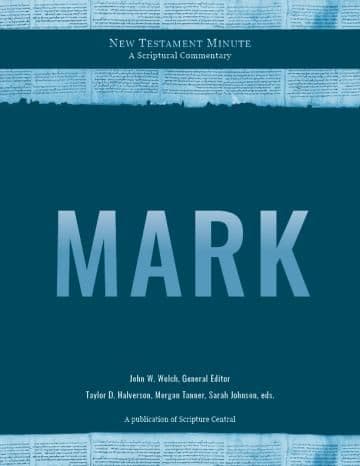Book
14 Chapters

The washing here was not about hygiene but rather about the preservation of ritual purity. These purity laws were part of an oral tradition that was observed by many, but not all, Jews of the time and were often at the center of debates between Jewish sects—as we see here. Jesus defied this particular oral tradition, classifying it among the “commandments of men.” The problem may not have been the traditions themselves but instead the judgmentalism associated with keeping them as well as the claim that they were God’s doctrine. Jesus then gave another example wherein a man dishonors his parents by keeping the korban vow, a man-made tradition that allows individuals to declare their property consecrated and thus unavailable as financial support for their parents. The use of such vows would also be debated and restricted by later rabbis.
Adapted from Julie M. Smith, The Gospel according to Mark (Provo, UT: BYU Studies, 2019), 434–443.
In these verses, Jesus continued to address the controversy over ritual washing prior to eating. Since the law of Moses itself imposes dietary restrictions and practices to maintain purity, it is likely that verse 15 is hyperbole meant to emphasize that inward moral purity is or should be at the heart of ritual purity laws. This declaration was surprising enough to His disciples that they asked for clarification from Jesus in private, and He seemed disappointed in their lack of understanding. Moral failings, the product of human wickedness, are the greater concern, not just whether one does or does not keep purity laws.
Adapted from Julie M. Smith, The Gospel according to Mark (Provo, UT: BYU Studies, 2019), 443–447.
In Tyre and Sidon, Jesus was in gentile territory. The motivation for this journey is unclear; perhaps He was avoiding the twin dangers of persecution and popularity. While there, He was approached by a surprising suppliant—a female, Greek-speaking Syrian. The cultural differences probably play a part in Jesus’s response, which may sound harsh. In Israel, dogs were not generally kept as pets but were strays, pests, and scavengers. References to dogs in the Old Testament are never positive, and the term is sometimes used as a demeaning insult to Gentiles and those lacking scriptural understanding. The point of Jesus’s statement is that His mortal ministry was primarily directed toward Israel, not outsiders (compare 3 Nephi 15:23).
The woman humbly adopted Jesus’s analogy, showing that the crumbs that fall to the dogs do not come at the children’s expense. Her imagery also recalls the surplus baskets of bread from Jesus’s miracle in the previous chapter (Mark 6:43); His power is not limited in scope and there is more than enough to bless the entire human family. Impressed by her faith and humility, Jesus granted her request. This faith and humility should be a model for all of us; instead of taking offense at a situation that could have easily been seen as unfair, the woman’s response turned a negative comparison into a positive one and brought about a miracle for her family.
Adapted from Julie M. Smith, The Gospel according to Mark (Provo, UT: BYU Studies, 2019), 447–460.
Decapolis was a grouping of ten cities in the region surrounding the Sea of Galilee. It includes such cities as Damascus (the capital of Syria) and Philadelphia (modern Amman, the capital of Jordan).
After the healing of a gentile woman’s daughter, Jesus passed through the gentile cities of the Decapolis on His way back to Galilee. Healing by spitting appears unusual, but anciently, saliva was equated with healing, and priests’ spit is known to have been used as part of ritual healing practice. Perhaps Jesus’s actions were also meant to stimulate the senses of the man, who could not hear what was going on, thus encouraging faith. After the healing, Jesus characteristically requested that the miracle be kept quiet, but the people were unable to restrain themselves from spreading the word.
Adapted from Julie M. Smith, The Gospel according to Mark (Provo, UT: BYU Studies, 2019), 460–464.
Book
14 Chapters
Items in the BMC Archive are made publicly available for non-commercial, private use. Inclusion within the BMC Archive does not imply endorsement. Items do not represent the official views of The Church of Jesus Christ of Latter-day Saints or of Book of Mormon Central.